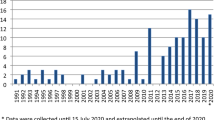Abstract
Accounting educators are being called on to provide a greater emphasis on ethics education. This paper examines three important issues concerning ethics education in accounting. First, the question of whether ethics can indeed be taught is examined. Next, several innovative approaches are presented which have been used by accounting educators to integrate ethics into the classroom. Finally, results of a survey of students concerning their perspectives of ethical issues in accounting education, the accounting profession, and society at large are presented and discussed. Survey results reveal that students consider a lack of ethics damaging to the accounting profession and society. Results also indicate that accounting students are seeking ethical and moral direction.
Similar content being viewed by others
References
Arthur Andersen & Co.: 1987, ‘National Commission on Fradulent Financial Reporting, Summary of Recommendations’,Accounting News Briefs (Supplement, April/May), 4.
Axline, L. L.: 1991, ‘Bottom Line on Ethics’,CGA Magazine 25, 24–30.
Berton, L.: 1991, ‘Trap Doors and Trojan Horses’,World (KPMG Peat Marwick magazine), 48.
Briloff, A. J.: 1991, ‘Ethics and Accounting Education’,Presentation Before the Canadian Academic Accounting Association, Queen's University, Kingston, Ont. (June 7).
Cohen, J. and R. Turner: 1990, ‘Ethics and Professionalism: The CPA in Industry’,The CPA Journal (April).
Collett, I. W.: 1988a,Accosting the Golden Spire (Thomas Horton & Daughters, Sun Lakes, AZ).
Collett, I. W.: 1988b,The Ultimate Rip-Off: A Taxing Tale (Thomas Horton & Daughters, Sun Lakes, AZ).
Collett, I. W. and L. M. Smith: 1991,Trap Doors and Trojan Horses (Thomas Horton & Daughters, Sun Lakes, AZ).
Colson, C.: 1989,Against the Night (Servant Publications, Ann Arbor, Michigan), pp. 67–68.
Craig, J. L.: 1991, ‘A Novel Approach to Teaching Auditing’,The CPA Journal (Aug.), 8.
Fess, R. C.: 1987, ‘Ethics in Accounting: Can It Be Taught?’,Outlook (Summer), 60.
Flesher, D. and T. Flesher: 1986, ‘Ivar Kreuger's Contribution to U.S. Financial Reporting’,Accounting Review (July), 421–434.
Flower, L., J. R. Hayes and H. Swarts: 1983, ‘Revising Functional Documents: The Scenario Principle’,New Essays in Technical and Scientific Research (Baywood Publishing Co., Inc., Farmingdale, N.Y.).
George, R. J.: 1987, ‘Teaching Business Ethics: Is There a Gap Between Rhetoric and Reality?’,Journal of Business Ethics (Oct.), 513–518.
Goldratt, E. M. and J. Cox: 1984,The Goal (North River Press, Croton-on-Hudson, N.Y.).
Hill, K. and D. Owen: 1985,Death on Demand (Thomas Horton & Daughters, Sun Lakes, AZ).
Jevons, M.: 1978,Murder at the Margin (Thomas Horton & Daughters, Sun Lakes, AZ).
Josephson, M. W.: 1992, ‘The Need for Ethics Education in Accounting’, in S. Albrecht (ed.),Ethical Issues in the Practice of Accounting (South-western Publishing Co., Cincinnati, Ohio), pp. 1–20.
Katz, P. C.: 1986, ‘Teaching Business Ethics’,Bottomline (Oct.), 41–42.
Kearn, R. P., T. G. Sticht, D. Welty and R. N. Hauke: 1976,Guidebook for the Development of Army Training Literature (U.S. Army Institute, Washington, D.C.).
Langenderfer, H. Q. and J. W. Rockness: 1989, ‘Integrating Ethics into the Accounting Curriculum: Issues, Problems, and Solutions’,Issues in Accounting Education (Spring), 58–69.
Lantos, G. P.: 1989, ‘Relative vs. Fixed Values: Choice is ‘Absolutely’ Clear’,Marketing Educator (Winter), 4, 6.
Levine, B.: 1990, ‘The Inside Story of an Inside Trader’,Fortune (May 20), 80–89.
Loeb, S. E.: 1988, ‘Teaching Students Accounting Ethics: Some Crucial Issues’,Issues in Accounting Education (Fall), 316–329.
Loeb, S. E.: 1984, ‘Codes of Ethics and Self-Regulation for Non-Public Accountants: A Public Policy Perspective’,Journal of Accounting and Public Policy 3, 1–8.
Lopez, J.: 1993, ‘More Big Businesses Set Up Ethics Offices’,Wall Street Journal (May 10), B1.
Milan, E. and F. McNair: 1992, ‘An Examination of Accounting Faculty Perceptions of the Importance of Ethics Coverage in Accounting Courses’,Business & Professional Ethics Journal (Summer), 57–71.
Nazario, S. L.: 1990, ‘Schoolteachers Say’,Wall Street Journal (April 6), B1, B6.
Owens, J.: 1983, ‘Business Ethics in the College Classroom’,Journal of Business Education (April), 258–262.
Pellegrino, E. D., R. J. Hart, S. R. Henderson and S. E. Loeb: 1985, ‘Relevance and Utility of Courses in Medical Ethics: A Survey of Physicians' Perceptions’,The Journal of the American Medical Association (Jan. 4), 49–53.
Putka, G.: 1992, ‘A Cheating Epidemic at a Top High School Teaches Sad Lessons’,Wall Street Journal (June 29), A1, A4, A5.
Rest, J. R. and S. J. Thomas: 1985, ‘Relation of Moral Judgement to Formal Education’,Developmental Psychology (July), 709–714.
Selley, D.: 1991, ‘Sustainable Ethics’,CA Magazine 124, 71–74.
Sharp, D.: 1990, ‘Novels as Teaching Tools: ‘The Goal’ in an Accounting Class’,Management Accounting Campus Report (Spring).
Siers, H. L.: 1990, ‘Enriching the Corporate Ethics Environment’,Management Accounting (April), 49–52.
Smith, L. M.: 1993a, ‘Teaching Ethics: An Update — Part I’,Management Accounting (March), 18–19.
Smith, L. M.: 1993b, ‘Teaching Ethics: An Update — Part II’,Management Accounting (April), 18.
Smith, L. M. and C. Bain: 1990, ‘The Challenge of Professional Accounting Ethics’,Internal Auditing (Spring), 20–31.
Smith, L. M., D. L. Crumbley and R. S. McDuffie: 1992, ‘A Novel Approach to Auditing Education’,Proceedings of the Southwest American Accounting Association Annual Meeting, 50–51.
Tetzeli, R.: 1991, ‘Accounting: The Whodunit’,Fortune (July 29), 14, 18.
Thomas, C.: 1988,The Death of Ethics in America (Word Books, Waco, Texas).
Thompson, J. H., T. L. McCoy and D. A. Wallestad: 1992, ‘The Incorporation of Ethics into the Accounting Curriculum’,Advances in Accounting, 91–103.
Wells, S. F.: 1985, ‘Ethics in Practice — A Personal Challenge’,The Internal Auditor (Feb.), 58–62.
Wolfson, M. and Burnaelli: 1984,In the Long Run We Are All Dead (St. Martins Press, Inc., New York).
Author information
Authors and Affiliations
Additional information
David S. Kerr is an Assistant Professor in the Department of Accounting at Texas A&M University. Dr. Kerr's research interests include ethics and behavioral decision making in accounting, group judgment/decision making, and audit planning.
L. Murphy Smith, is a Price Waterhouse Teaching Excellence Professor of Accounting at Texas A&M University. His major research interests are information systems, auditing, and international issues.
Rights and permissions
About this article
Cite this article
Kerr, D.S., Smith, L.M. Importance of and approaches to incorporating ethics into the accounting classroom. J Bus Ethics 14, 987–995 (1995). https://doi.org/10.1007/BF00872114
Issue Date:
DOI: https://doi.org/10.1007/BF00872114




